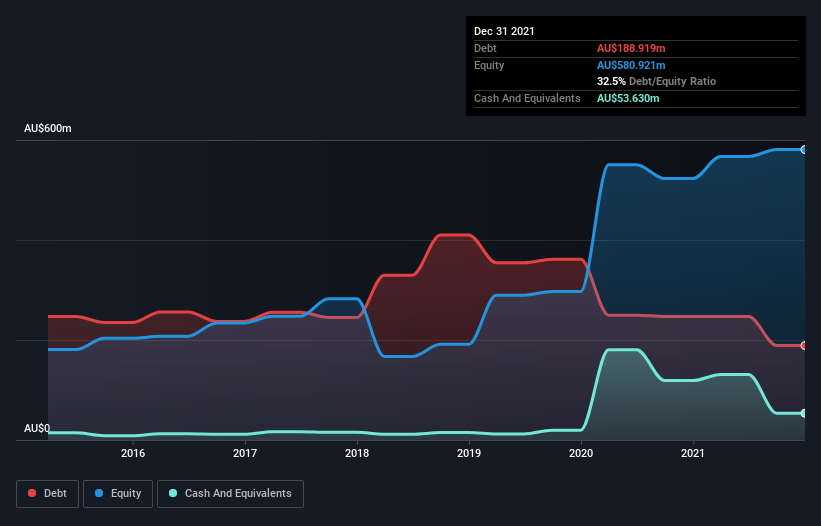
Warren Buffett famously said, 'Volatility is far from synonymous with risk.' When we think about how risky a company is, we always like to look at its use of debt, since debt overload can lead to ruin. Importantly, InvoCare Limited (ASX:IVC) does carry debt. But the more important question is: how much risk is that debt creating?
When Is Debt Dangerous?
Debt is a tool to help businesses grow, but if a business is incapable of paying off its lenders, then it exists at their mercy. Ultimately, if the company can't fulfill its legal obligations to repay debt, shareholders could walk away with nothing. However, a more usual (but still expensive) situation is where a company must dilute shareholders at a cheap share price simply to get debt under control. Having said that, the most common situation is where a company manages its debt reasonably well - and to its own advantage. When we examine debt levels, we first consider both cash and debt levels, together.
See our latest analysis for InvoCare
How Much Debt Does InvoCare Carry?
The image below, which you can click on for greater detail, shows that InvoCare had debt of AU$188.9m at the end of December 2021, a reduction from AU$247.2m over a year. On the flip side, it has AU$53.6m in cash leading to net debt of about AU$135.3m.

How Strong Is InvoCare's Balance Sheet?
The latest balance sheet data shows that InvoCare had liabilities of AU$197.6m due within a year, and liabilities of AU$978.6m falling due after that. Offsetting these obligations, it had cash of AU$53.6m as well as receivables valued at AU$57.2m due within 12 months. So its liabilities outweigh the sum of its cash and (near-term) receivables by AU$1.07b.
This is a mountain of leverage relative to its market capitalization of AU$1.72b. Should its lenders demand that it shore up the balance sheet, shareholders would likely face severe dilution.
In order to size up a company's debt relative to its earnings, we calculate its net debt divided by its earnings before interest, tax, depreciation, and amortization (EBITDA) and its earnings before interest and tax (EBIT) divided by its interest expense (its interest cover). The advantage of this approach is that we take into account both the absolute quantum of debt (with net debt to EBITDA) and the actual interest expenses associated with that debt (with its interest cover ratio).
Given net debt is only 1.3 times EBITDA, it is initially surprising to see that InvoCare's EBIT has low interest coverage of 2.1 times. So one way or the other, it's clear the debt levels are not trivial. Importantly, InvoCare grew its EBIT by 66% over the last twelve months, and that growth will make it easier to handle its debt. When analysing debt levels, the balance sheet is the obvious place to start. But it is future earnings, more than anything, that will determine InvoCare's ability to maintain a healthy balance sheet going forward. So if you're focused on the future you can check out this free report showing analyst profit forecasts.
Finally, while the tax-man may adore accounting profits, lenders only accept cold hard cash. So the logical step is to look at the proportion of that EBIT that is matched by actual free cash flow. In the last three years, InvoCare basically broke even on a free cash flow basis. Some might say that's a concern, when it comes considering how easily it would be for it to down debt.
Our View
InvoCare's interest cover and conversion of EBIT to free cash flow definitely weigh on it, in our esteem. But the good news is it seems to be able to grow its EBIT with ease. We think that InvoCare's debt does make it a bit risky, after considering the aforementioned data points together. Not all risk is bad, as it can boost share price returns if it pays off, but this debt risk is worth keeping in mind. There's no doubt that we learn most about debt from the balance sheet. But ultimately, every company can contain risks that exist outside of the balance sheet. To that end, you should be aware of the 1 warning sign we've spotted with InvoCare .
At the end of the day, it's often better to focus on companies that are free from net debt. You can access our special list of such companies (all with a track record of profit growth). It's free.
New: AI Stock Screener & Alerts
Our new AI Stock Screener scans the market every day to uncover opportunities.
• Dividend Powerhouses (3%+ Yield)
• Undervalued Small Caps with Insider Buying
• High growth Tech and AI Companies
Or build your own from over 50 metrics.
Have feedback on this article? Concerned about the content? Get in touch with us directly. Alternatively, email editorial-team (at) simplywallst.com.
This article by Simply Wall St is general in nature. We provide commentary based on historical data and analyst forecasts only using an unbiased methodology and our articles are not intended to be financial advice. It does not constitute a recommendation to buy or sell any stock, and does not take account of your objectives, or your financial situation. We aim to bring you long-term focused analysis driven by fundamental data. Note that our analysis may not factor in the latest price-sensitive company announcements or qualitative material. Simply Wall St has no position in any stocks mentioned.
About ASX:IVC
InvoCare
InvoCare Limited provides funeral, cemetery, crematoria, and related services in Australia, New Zealand, and Singapore.
Reasonable growth potential with mediocre balance sheet.
Market Insights
Community Narratives



